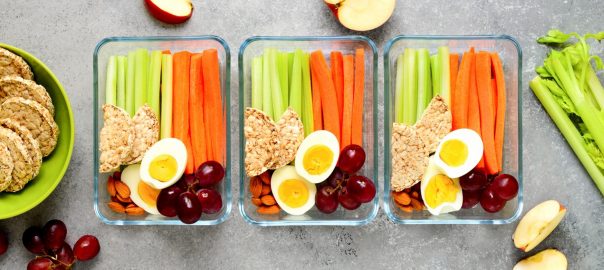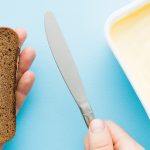
Getting a Handle on Portion Sizes
7 Tips For Better Portion Control
These are our tips for better portion control that can help you manage your weight and avoid binge eating.
Disclaimer: The information in this article is not medical advice. A low carb diet may not be suitable for you. Consult your health care provider before making any changes to your lifestyle or use at your own risk.
Portion control may be one of the biggest issues people struggle with when dieting. Our culture also plays a big role in our perceptions around the “right” amount of food to eat, as we are often influenced by what we are served at restaurants or what is advertised to us as a healthy portion. In Canada, we may be a bit closer to proper portion size restrictions than in our neighbouring country, USA, where you can order a dinner-sized platter for one at many popular restaurants. That said, portion control is a problem all over the Western world.
Although there is no “right” amount of food that everyone should be eating, there are a few ways you can determine what is right for you and your body. In this article, we share our tips that you can use to help manage your portions. If you follow our guidelines, you should have a better idea of when you feel full and know when to stop eating. Always eat when you are hungry and eat enough until you feel satisfied, not stuffed.
Here are some reasons why you may be overeating…
- You’re not eating balanced meals.
A balanced meal should contain each of the three macronutrients: carbs, protein and healthy fats. If you are on a low carb diet, you may eliminate certain carbohydrates such as sugars and starches, but you should always include fibre in your meals (more on this later).
Having a balance of macronutrients will ensure that your body has everything it needs to function, keep you satiated, and feeling energized. Protein and healthy fats are especially important to include, but often people get confused about how much they should be eating. Most Western diets over-emphasize protein and forget about, if not discourage, adding fats to your plate. As a general rule of thumb, about half of your plate should consists of raw or cooked vegetables and/or fruits, one quarter lean, healthy protein, and one quarter healthy fats. If you follow a low carb or ketogenic diet, these portions may look slightly different, so adjust accordingly.
Protein is the most filling macronutrient because protein reduces your ghrelin, or “hunger hormone”, levels. It also increases levels of hormones that make you feel full. Include protein in your meals, especially at breakfast, to reduce your ghrelin levels throughout the day. Good choices for protein rich foods include:
- Lean grass-fed meat
- Free range poultry and eggs
- Wild caught fish and shellfish
- Nuts and seeds
- Legumes
- Protein powders, which can be added to smoothies, hot cereals or baked goods
- Full fat dairy products
Fats, especially healthy fats, are also vital for appetite control. Since they are broken down by the body much slower than carbohydrates, they can keep you feeling energized for hours. Like proteins, they also help regulate your appetite hormones. The best types of fats to consume are unsaturated fats, found in things like olive oil, avocados, nuts and seeds, and fatty fish. Other good choices include coconut oil, full fat dairy products, eggs and dark chocolate.
Here’s another quick tip for snacking: if you are just a little bit hungry, opt for a snack rich in healthy fats. If you are very hungry, grab something packed with protein. We recommended getting started with some of these:
-
- BUFF Artisan Bison Jerky Snacks – has higher protein than beef with a richer, meaty flavour.
- Nick’s Sticks 100% Grass-Fed Beef Jerky – traditional beef sticks without the extra sugar.
- Cheese Snacks – choose from a variety of shelf stable snacks made from 100% cheese.
- Low Carb Snack Bars – various options that are nutritious, delicious and convenient to eat on-the-go.
- Nut-based Snacks – raw, seasoned, sweet or savoury, they provide a protein boost that help you feel full.
- Lily’s Sugar-Free Chocolates – cures your cravings without added sugars.
- You’re emotional eating.
This is a big reason why many people overeat. Food satisfies the parts of our brains that are also responsible for how we feel. When we are feeling down, eating food – especially sweets – releases brain chemicals that temporarily make us feel good. However, this is not a sustainable solution for improving your mood, especially if you suffer from a diagnosed mood disorder. In addition, binge eating as a way to cope with emotions can cause rapid weight gain, which may further contribute to low self-esteem and negative moods. Try engaging in other activities such as yoga, exercise, or socializing with friends and family to improve your mood and seek professional help when necessary.
- You eat while distracted.
We are all guilty of distracted eating sometimes! Whether you turn on the TV, scroll through your phone, eat at your work desk, or while you’re driving, you are bound to lose track of how much food is going into your mouth. Our brains cannot multitask, so when you engage in something else while eating it can be very easy to mindlessly over-consume. When you slow down and focus on your food, you will find that you not only enjoy and savour your food more, but you will also feel full faster since your brain is more focused on the sensations of eating. Choose one meal a day when you tend to be the most distracted and challenge yourself to eliminate all of your typical distractions during that time. Good luck!
- You’re not drinking enough water.
Sometimes we think we are hungry, but we’re actually just dehydrated and don’t realize it. It doesn’t take much for us to become dehydrated, and typically we are already dehydrated by the time we feel thirsty. If you find yourself frequently craving carbs or sweets, this is a good sign that you are dehydrated because these foods can provide the same quick surge of energy as a glass of water. Remember to drink water consistently throughout the day, aiming for 2-4L of water each day. In addition, be aware of things that can further dehydrate you such as caffeine or alcohol consumption and exercise.
- You don’t eat enough fibre.
As we mentioned earlier, eating fibre with every meal is essential. Fibre helps us feel fuller longer and promotes healthy digestion. Aim to consume fruits or vegetables with every meal and include other fibre-rich foods in your diet such as flax seeds, chia seeds, whole grains, and legumes (if they comply with your dietary specifications). Fibre is not something to be omitted on low carb diets, just because it is a type of carbohydrate. Fibre will not spike your blood sugar levels or cause weight gain, and in fact, it can provide benefits in both of these areas.
- You prepare too much food.
It can be hard to know how much you should be eating if you don’t have an idea of the amount of calories and macronutrients in the foods you eat. There are many apps that can help you determine the right amount of food you should eat by showing you the calorie and nutrient breakdown of foods (such as this one). These are especially helpful for foods that do not come with nutrition labels such as fruits, meat, and anything bought in bulk. It may also be helpful to invest in the right measuring tools for your kitchen or a kitchen scale.
Cooking when you are hungry can also cause you to overbudget how much you really need to eat. If this is a frequent problem for you, try to have a light, healthy snack before meals to ensure you are making sound portion choices.
Some other tips related to involve how you plate and serve your food. We eat with our eyes first, so the way you present your food does make a difference. Use smaller plates and bowls to make it feel like you are eating more. Also, place food on individual plates instead of leaving the serving dishes on the table or counter where it can be easy to go back for seconds (embrace leftovers!). In addition, avoid eating straight out of packets, jars, tubs, etc. as this doesn’t allow you to easily measure how much you are eating.
Also be aware of eating habits that you could have picked up from family members in the household or from your childhood. You may be used to the portions you were served growing up or that you saw others eating around you. Everyone has a unique body composition and metabolic rate, even if you are genetically related. In addition, your family members may not be the experts on portion control, so make your own choices for what is right for your body.
- You skip meals.
Skipping meals can throw your hunger levels out of balance. A lot of people tend to skip meals thinking that this will help them lose weight. However, the key to weight loss and weight management is ensuring that you are getting the right nutrition by eating balanced meals regularly. If you choose to intermittent fast, it is still important to eat the right amount of calories during your non-fasting window. Skipping meals, especially breakfast, can lead to imbalanced appetite levels throughout the rest of the day and can increase your chances of overeating at your next meal.
Stay Connected
We hope that you gained some helpful insights from our portion control tips! If you would like to share your thoughts or hear what others are saying, head over to our Facebook and Instagram pages. You can also let us know about your experiences directly by leaving us a Google Review! We’d love to hear your feedback! And don’t forget to subscribe to our email newsletter, where we share the most up-to-date keto news and the best low carb and sugar free product sales!






